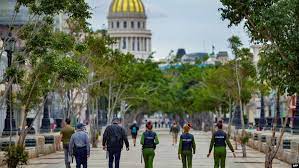
Why Cuba Is Preventing Opponents from Protesting
Cuban police deployed in large numbers across the city of Havana on Monday to prevent a banned demonstration from taking place on Monday afternoon. Police also arrested protest organizers and surrounded the homes of activists and independent journalists to prevent them from attending. The show of force effectively silenced the event.
The government of President Miguel Diaz-Canel had banned the “Civic March for Change” on accusations that it was part of a U.S. interventionist plan. U.S. officials have denied the charge. Cuba’s prosecutor’s office had warned that those who tried to carry out the demonstration would be jailed.
Here are some key facts about the thwarted demonstration and the government’s response.
Who organized the protest?
A Facebook group called Archipiélago, led by 39-year-old playwright Yunior Garcia Aguilera, planned Monday’s protest. The group sought official permission for the march in September but was swiftly denied. Archipiélago says it has 35,000 followers, more than half of whom live inside Cuba.
What were the protester organizers calling for?
The planners of the demonstration had called for greater freedoms and the release of prisoners, especially those detained during July demonstrations. Hundreds of protesters have remained in jail following arrests in July, organizers said.
Why did Cuba ban the protest?
Cuban Foreign Minister Bruno Rodriguez labeled the protest as a “destabilizing operation designed in Washington.” The government said it would not tolerate what it calls “counterrevolutionary” and “terrorist” acts.
Who was arrested?
The Cuban government arrested prominent dissidents hours before the planned rally on Monday. Agence France-Presse reported that those arrested included opposition figure Manuel Cuesta Morua; Berta Soler, the leader of the Ladies in White rights movement; and Soler’s husband, Angel Moya.
What did the United States say?
U.S. Secretary of State Antony Blinken said in a statement on Sunday, “We call on the Cuban government to respect Cubans’ rights, by allowing them to peacefully assemble and use their voices without fear of government reprisal or violence, and by keeping Internet and telecommunication lines open for the free exchange of information.”
Were protests held outside Cuba?
Supporters of Cuba’s opposition staged protests Sunday and Monday around the world, including in Miami, Florida — home to a large Cuban population — Colombia, Chile, Canada and Spain.
What happened in Cuba’s July protests?
Cuban police and military units were dispatched to crack down on a peaceful demonstration that was fueled by economic hardship and demands for more political freedoms. Thousands were arrested, and many still face charges.
Some information in this report came from The Associated Press, Reuters, and Agence France-Presse.
